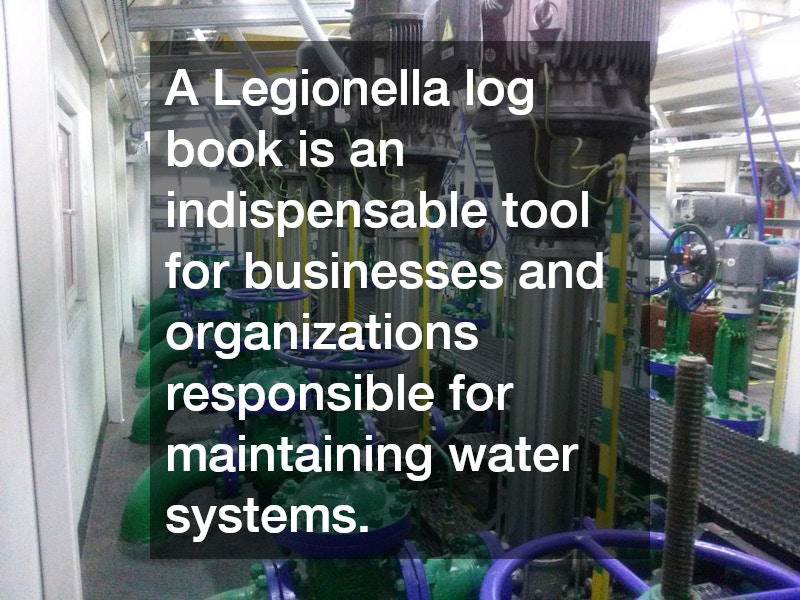Why You Should Use a Legionella Log Book

Managing water systems in commercial, industrial, and residential environments requires diligence and attention to detail. One of the most effective tools for monitoring and maintaining the safety of water systems is the Legionella log book. Though often associated with health and safety, a Legionella log book offers a range of benefits that go beyond preventing Legionella bacteria.
This document plays a key role in keeping water systems running smoothly, ensuring regulatory compliance, and providing peace of mind. Here’s why you should use a Legionella log book.
Streamlines Compliance and Record-Keeping
A well-maintained Legionella log book ensures that all required maintenance and monitoring tasks are documented accurately and on time. Regulatory bodies, such as the Health and Safety Executive (HSE) in the UK, require businesses to keep detailed records of water system inspections, testing, and cleaning procedures. Failure to comply with these regulations can lead to significant fines or legal action.
By using a Legionella log book, businesses can easily track their compliance with these safety standards. This includes monitoring water temperatures, cleaning schedules, and testing results. The log book provides an organized structure for keeping all this information in one place, allowing for easy retrieval during audits or inspections.
Encourages Regular Maintenance
Maintaining water systems is essential to prevent potential issues such as contamination, scaling, or corrosion. A Legionella log book provides a structured approach to scheduling and documenting regular maintenance tasks, ensuring that no steps are missed. This consistent approach to upkeep can extend the life of equipment and reduce the risk of system failures.
For example, tasks like descaling hot water systems, flushing unused outlets, and checking for leaks can be easily documented in the log book. This makes it clear when specific maintenance was last performed and when it’s due next. Having this level of detail promotes accountability within the team responsible for water system management.
Provides Legal Protection and Peace of Mind
In the event of an issue, such as a Legionella outbreak or another water-related incident, having a detailed and up-to-date Legionella log book can provide legal protection. It serves as evidence that the business or property owner followed the appropriate procedures and took reasonable precautions to maintain a safe water system. This documentation can be crucial in demonstrating due diligence and mitigating liability if legal challenges arise.
In industries where public health and safety are paramount, such as healthcare, hospitality, and education, a Legionella log book not only helps comply with regulations but also provides peace of mind. Knowing that the water systems are regularly monitored and maintained creates a safer environment for both employees and clients.
Tailored to Site-Specific Needs
One of the advantages of a Legionella log book is that it can be customized to fit the specific requirements of your facility. Whether you manage a small office building or a large industrial complex, the log book can be adapted to suit your water system’s unique needs. This includes detailing the specific water outlets, equipment, and monitoring frequencies relevant to your setup.
Tailoring the log book in this way ensures that all critical areas are covered and that the system’s particular vulnerabilities are addressed. Whether the risk comes from stagnating water in unused outlets or fluctuating temperatures in the water supply, a well-designed Legionella log book will guide your team through necessary preventative measures.
Supports Training and Accountability
For facilities that employ a team responsible for water system maintenance, a Legionella log book serves as a critical training tool. It outlines the tasks that need to be performed, provides step-by-step guidance on monitoring and testing procedures, and helps new staff members quickly understand their responsibilities.
Moreover, the log book can be used to assign specific tasks to individuals, ensuring accountability. When team members log their completed tasks with the date and their initials, it becomes clear who is responsible for each aspect of water system maintenance. This level of accountability reduces the likelihood of tasks being overlooked and promotes a higher standard of care.
Helps Identify Trends and Potential Issues
One of the most practical benefits of using a Legionella log book is that it allows for the identification of trends and potential problems in your water system over time. By reviewing past entries, you can spot recurring issues such as fluctuating water temperatures, increased sediment buildup, or frequent equipment failures. Identifying these trends early enables you to take preventative action before small problems escalate into larger, costlier issues.
Additionally, if a test result shows elevated bacteria levels or other anomalies, the log book provides a detailed history that can help determine the cause. You can review when the system was last cleaned, when water temperature checks were conducted, and whether any irregularities were documented. This level of insight can lead to more effective problem-solving and better overall system management;
A Legionella log book is an indispensable tool for businesses and organizations responsible for maintaining water systems. It goes beyond preventing the growth of Legionella bacteria, helping to ensure regulatory compliance, facilitate regular maintenance, and provide legal protection. The log book also enhances accountability within maintenance teams, supports training efforts, and helps identify long-term trends that can prevent costly issues. By using a Legionella log book, you are not only fulfilling legal obligations but also investing in the longevity and safety of your water systems.
.




